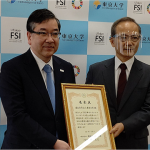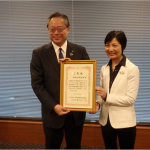"Guidance on Adaptation Finance(final version)”.Proposing to introduce three steps approach including "proxy cash flow" from adaptation projects (RIEF)
2023-10-23 21:58:25

The Research Institute for Environmental Finance (RIEF) has released the “Guidance on Adaptation Finance” (final version) for private financing of climate change adaptation projects. After consultation on the draft announced on July 18 this year, some revisions have been made and will be announced this time.
The guidance maintains a three-step approach of selecting taxonomies for adaptive businesses, utilizing taxonomies to generate expected cash flows, and setting proxy cash flows to actually visualize future adaptive expectations. We proposed the establishment of a new financial covenant clause in the guidance. We received 14 comments from 10 people from inside and outside the consultation.
This summer, from June to September, the average global temperature continued to record highs every month. It was a clear departure from the trend of temperature rise until last year, and the phase of temperature rise was different. It has also been pointed out that there is a risk that the 1.5°C target set by the Paris Agreement will be exceeded before 2030 at the earliest.
In order to put a stop to this situation, it is necessary to further implement mitigation measures to curb greenhouse gas (GHG) emissions, but policy responses by major countries continue to be delayed. It can be said that the urgency of adaptation projects in response to the increase in climate disasters caused by intensifying climate change is increasing.
In such an environment, the 28th session of the Conference of the Parties (COP28) to the United Nations Framework Convention on Climate Change (UNFCCC) from the end of November to December will be expected to focus on the realization of financing for “loss and damage” by climate change disasters. The RIEF’s guidance was prepared with the aim of contributing to the discussion of international adaptation measures as one of the proposals from non-profit organization in Japan.
The climate change policies by current government of Japan is not sufficiently prepared for climate mitigation measures and continues to develop policies to preserve the fossil fuel industry. As for the importance of financing adaptation projects, the government is almost reluctant to do so. Under such circumstances, the Guidance is proposed on the assumption that private financial markets will be utilized in order to promote mitigation and adaptation measures in a bilateral manner.
The guidance positions such a framework as a “new blended finance scheme” for public-private partnerships.
<RIEF : Adaptation Finance Study Group>
・Asuka, Jyusen(Professor for Tohoku University)
・Fujii, Yoshihiro(Executive Director of the Research Institute for Environmental Finance : lead author)
・Horiguchi, Munetaka(Special Appointed Professor of Kyoto University)
・Kobayashi, Yasuchika(General Manager of Tokio Marine & Nichido Fire Insurance CO.,Ltd.)
・Murai, Hideki(Professor of Nihon University)
・Niimi, Takaharu(Specialist of Japan Research Institute)
・Ochi, Nobuhito (Professor for Kanto-Gakuin University)
・Sakakibara, Kei(Manager of Ernst Young ShinNihon LLC)
・Yamamoto, Toshiaki(former Professor of Osaka Electro-Communication University)

































 Research Institute for Environmental Finance
Research Institute for Environmental Finance